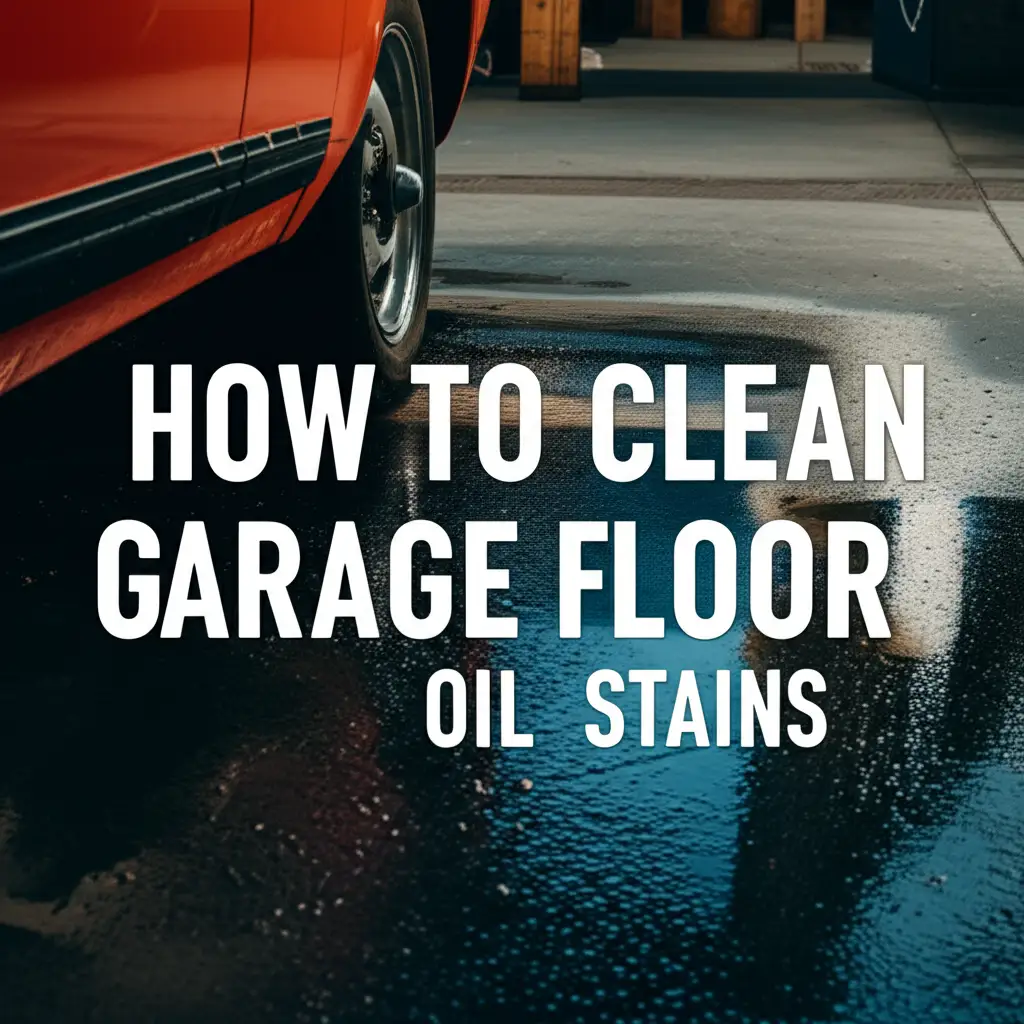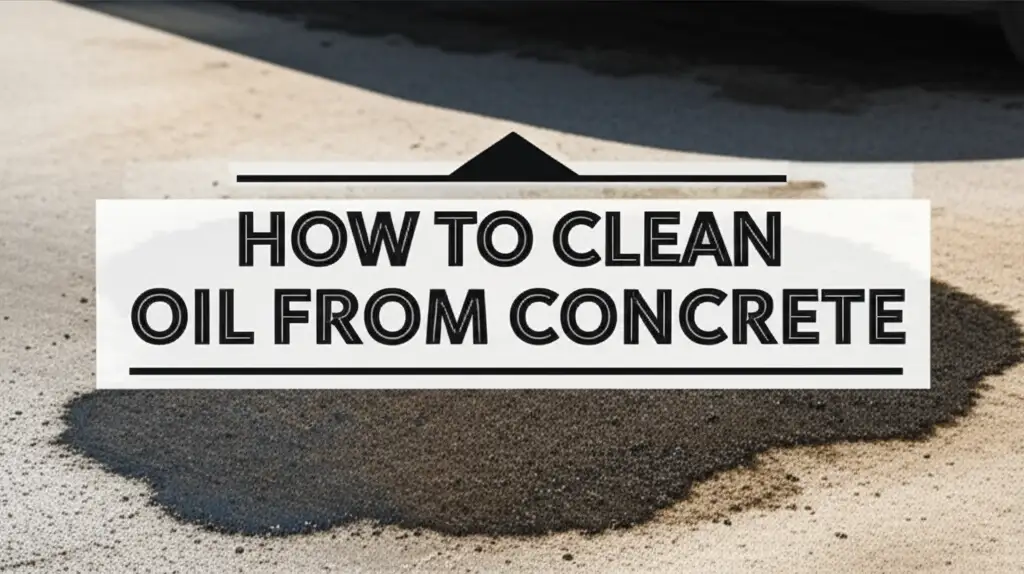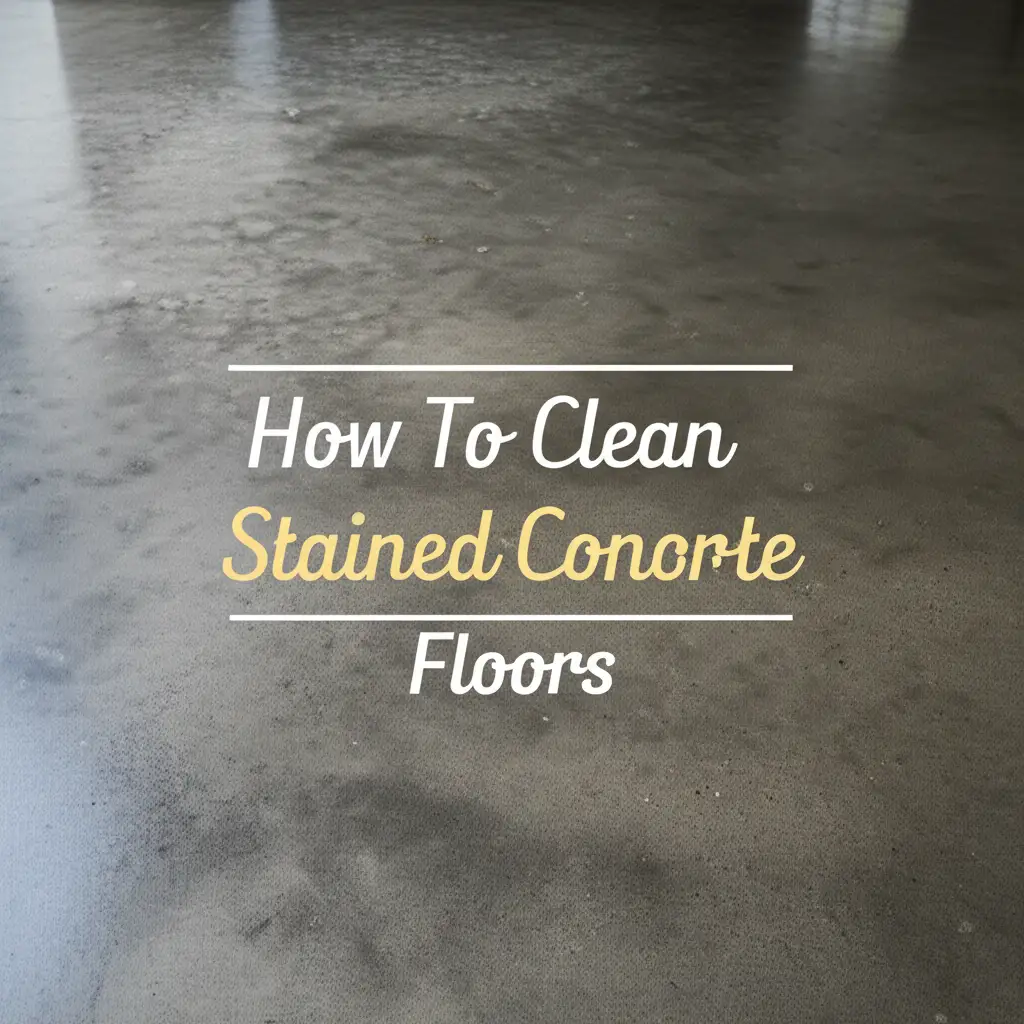· Garage Maintenance · 17 min read
How To Clean Epoxy Garage Floor

Mastering Epoxy Garage Floor Cleaning for a Pristine Look
Your garage floor takes a lot of abuse. It faces oil drips, mud, dirt, and heavy vehicle traffic. If you have an epoxy coating, you made a smart choice for durability and appearance. However, even the toughest surfaces need care. Knowing how to clean epoxy garage floor correctly keeps it looking great and extends its life. This guide helps you maintain your epoxy floor with ease. We will cover routine cleaning, tough stain removal, and important tips to avoid damage. Get ready to give your garage floor the attention it deserves.
Takeaway
- Routine Cleaning: Sweep regularly and mop with mild soap and water to prevent dirt buildup.
- Stain Removal: Address spills quickly using specific methods for oil, grease, and rust.
- Avoid Harsh Cleaners: Steer clear of acidic or abrasive cleaners that damage epoxy.
- Protect Your Floor: Use mats under vehicles and clean hot tire marks promptly.
- Deep Clean Annually: Perform a thorough deep clean to restore shine and remove embedded grime.
To clean an epoxy garage floor, first remove loose debris with a soft-bristle broom or leaf blower. Then, mop the surface using warm water mixed with a mild, pH-neutral cleaner or dish soap. For tough spots, use a soft scrub brush. Rinse thoroughly with clean water and let the floor air dry.
Why Your Epoxy Garage Floor Needs Specific Care
Epoxy floors are popular for many reasons. They offer a strong, durable, and attractive surface for your garage. This protective coating resists many common garage hazards. These include oil spills, chemical splashes, and abrasive dirt. However, epoxy is not indestructible. It requires specific cleaning methods to maintain its integrity and shine. Using the wrong products or techniques can dull its finish or even cause damage.
Understanding how epoxy works helps you clean it better. Epoxy is a thermosetting polymer that creates a hard, non-porous surface. This means liquids do not easily penetrate it. Dirt and grime sit on top, making cleaning easier than with bare concrete. The smooth surface also prevents dust accumulation and makes sweeping simple.
Proper cleaning ensures your epoxy floor stays beautiful. It prevents the buildup of abrasive particles that can scratch the surface. Regular maintenance also keeps the floor safe by removing slippery substances. A well-maintained epoxy floor enhances the look of your entire garage. It also contributes to a cleaner, more organized workspace. I often tell people that a clean floor sets the tone for the whole room. Your epoxy floor deserves care that matches its quality.
Neglecting your epoxy floor can lead to problems. Embedded dirt can make the surface look dull. Stubborn stains become harder to remove over time. Abrasive cleaners can strip the protective layer. This leaves your floor vulnerable to damage. By following proper cleaning guidelines, you ensure your epoxy coating lasts for many years. You protect your investment and keep your garage looking its best.
Essential Tools and Cleaning Solutions for Epoxy Floors
Having the right tools and cleaning solutions makes cleaning your epoxy garage floor much easier. You do not need many specialized items. Most are simple household products. Using the correct tools prevents scratches and preserves your floor’s finish. A soft-bristle broom is essential for daily sweeping. It removes loose dirt and debris without scratching the epoxy. A leaf blower can also quickly clear larger areas.
For general cleaning, you need a mop and two buckets. One bucket holds your cleaning solution, the other for rinsing. A microfiber mop or a regular string mop works well. Avoid mops with abrasive pads that could harm the epoxy. A squeegee is helpful for pushing water off the floor during rinsing. This speeds up drying and prevents water spots. For stubborn spots, a soft-bristle brush or deck brush is useful. You can attach it to a pole for easier scrubbing.
When it comes to cleaning solutions, simplicity is key. A mild, pH-neutral cleaner is best for routine maintenance. Dish soap, like Dawn, mixed with warm water, is an excellent choice. It cuts through grease and grime effectively without harming the epoxy. Avoid harsh chemicals, acidic cleaners, or abrasive powders. These can damage the epoxy finish. Ammonia-based cleaners, bleach, and citrus cleaners are generally not recommended.
For specific stains, you might need specialized solutions. A degreaser can tackle oil and grease spots. Make sure it is formulated for use on coated concrete or epoxy. For rust stains, a rust remover designed for epoxy floors is necessary. Always test any new cleaning solution on an inconspicuous area first. This ensures it does not cause discoloration or damage. I always test new products to be safe. This helps me avoid any surprises later on.
- Soft-bristle broom or leaf blower: For daily debris removal.
- Mop and two buckets: For washing and rinsing.
- Squeegee: To remove excess water efficiently.
- Soft-bristle brush: For scrubbing tough spots.
- Mild, pH-neutral cleaner: Such as dish soap (e.g., Dawn) mixed with warm water.
- Approved degreaser: For oil and grease stains.
- Epoxy-safe rust remover: For rust spots.
- Clean cloths or towels: For wiping and drying specific areas.
Routine Cleaning: Keeping Your Epoxy Floor Pristine
Regular maintenance is crucial for keeping your epoxy garage floor in top condition. Simple, routine cleaning prevents dirt and grime from building up. This makes deep cleaning less frequent and less challenging. Think of it as preventative care for your floor. I find that a little effort often saves a lot of work later.
Start with sweeping or blowing. You should sweep your epoxy garage floor at least once a week. If your garage sees a lot of foot traffic or vehicle use, sweep more often. A soft-bristle broom or a leaf blower quickly removes loose dirt, dust, and small debris. This prevents these particles from scratching the surface when walked or driven on. Ensure you get into corners and under any stored items. This step is fundamental to maintaining the floor’s integrity.
After sweeping, a light mopping can remove fine dust and light stains. Fill one bucket with warm water and a few drops of mild dish soap. Use a clean mop and thoroughly wet the floor. Work in small sections, applying gentle pressure. The goal is to lift dirt, not to scrub aggressively. Rinse the mop frequently in a separate bucket of clean water. This prevents you from spreading dirty water around.
Once you have mopped the entire floor, rinse it thoroughly with clean water. This removes any soap residue that could dull the finish or make the floor slippery. You can use a clean mop with fresh water for rinsing. Alternatively, use a squeegee to push the dirty water towards a drain or outside the garage door. Allowing the floor to air dry completely is usually sufficient. For quicker drying, you can use a fan.
Regular cleaning not only keeps your epoxy floor looking good but also prolongs its life. It prevents embedded dirt and reduces the need for harsh cleaning chemicals. This routine maintenance is quick and easy. It protects your investment and maintains a clean, inviting garage space. I have found this simple routine makes a big difference.
Tackling Tough Stains on Epoxy Garage Floors
Epoxy floors are stain-resistant, but spills still happen. Knowing how to deal with specific tough stains ensures your floor remains spotless. Act quickly when spills occur. The longer a stain sits, the harder it can be to remove. Different stains require different approaches.
Oil and Grease Stains: These are common in garages. For fresh spills, blot the area immediately with paper towels or an absorbent cloth. Avoid wiping, as this can spread the stain. For dried oil or grease, apply a degreaser designed for epoxy floors. Follow the product instructions. You can gently scrub the stain with a soft-bristle brush. Let the degreaser sit for a few minutes. Then, wipe it away with a clean cloth and rinse the area thoroughly with water. If you need more detailed instructions on removing oil, you can check guides like how to clean oil off garage floor or how to clean garage floor oil stains. Sometimes, a specific product makes a big difference.
Tire Marks: Hot tires can leave dark marks on epoxy floors. These are not true stains but plasticizer migration from the tires. For fresh marks, a mild degreaser and a soft brush often work. For older, tougher marks, a commercial degreaser designed for tire marks might be necessary. Apply, scrub gently, and rinse well. Do not use abrasive pads, as they can scratch the epoxy.
Rust Stains: Water, especially from tools or car parts, can leave rust marks. Use a rust remover specifically formulated for concrete or epoxy surfaces. Apply a small amount to the stain. Let it sit for the recommended time. Then, gently scrub with a soft brush and rinse thoroughly. Always test the rust remover on an inconspicuous area first. This prevents any unwanted reactions with your epoxy coating.
Paint Spills: For fresh paint spills, wipe them immediately with a damp cloth. For dried paint, you can try gently scraping it with a plastic scraper. Be very careful not to scratch the epoxy. Mineral spirits or denatured alcohol can sometimes dissolve dried paint. Apply a small amount to a cloth, dab the stain, and then wipe. Always rinse the area well afterward.
General Stains: For dirt or muddy stains, a simple mix of warm water and dish soap usually suffices. Scrub with a soft brush and rinse. Remember, patience and proper products are key. Avoid harsh chemicals like bleach or Muriatic acid, which can damage your epoxy finish. Always rinse all cleaning agents thoroughly to prevent residue buildup. You can also explore general advice on how to clean oil spill on floor for broader insights.
Deep Cleaning Your Epoxy Garage Floor
While routine cleaning keeps your epoxy floor neat, a deep clean is essential once or twice a year. This removes embedded dirt and restores the floor’s original luster. Deep cleaning goes beyond a simple mop and bucket. It tackles grime that builds up over time. This process is like a reset for your garage floor. It prepares it for another period of heavy use. I find that a deep clean makes my garage feel brand new again.
Start by clearing the garage floor. Move vehicles, tools, and any stored items. This gives you full access to the entire surface. Sweep or blow away all loose debris, dust, and cobwebs. This step is critical because you do not want to grind dirt into the epoxy during the cleaning process. Pay extra attention to corners and edges where debris tends to accumulate.
Next, prepare a strong but safe cleaning solution. Mix warm water with a generous amount of a pH-neutral cleaner or heavy-duty degreaser designed for coated floors. For example, some specialized epoxy floor cleaners are available. For a more natural option, a solution of vinegar and water can also work well if you are facing mild issues like hard water spots or slight dullness. (For mold related issues, how to clean mold with vinegar offers more details on vinegar’s cleaning power.) Apply the solution generously over a section of the floor. Let it sit for 5-10 minutes. This dwell time allows the cleaner to break down stubborn grime.
Use a medium-bristle deck brush or a floor scrubber to agitate the cleaner. Scrub in circular motions, focusing on areas with heavy grime or tire marks. The goal is to lift the dirt, not to apply excessive force. You will notice the solution becoming dirty as it loosens the grime. If your garage is very large, consider renting a walk-behind floor scrubber for efficiency. These machines can make deep cleaning much faster.
Finally, rinse the entire floor thoroughly with clean water. Use a hose or multiple buckets of fresh water. A squeegee is highly effective at moving the dirty water towards a drain or out of the garage. Make sure all cleaning solution residue is removed. Leftover soap can make the floor slippery or dull. Allow the floor to air dry completely before moving items back. This deep cleaning process will rejuvenate your epoxy floor.
Avoiding Damage: What Not to Use on Epoxy Floors
Knowing what not to use is as important as knowing what to use when cleaning your epoxy garage floor. Using the wrong cleaners or tools can cause irreversible damage. This includes dulling the finish, scratching the surface, or even breaking down the epoxy coating itself. Your goal is to preserve the protective qualities of your epoxy floor.
First, avoid acidic cleaners. Products like vinegar (in high concentrations or frequent use), citrus cleaners, or cleaners containing harsh acids will etch the epoxy surface over time. While vinegar can be used for light cleaning in diluted forms, excessive use can compromise the shine. For instance, while it is good for cleaning showers, as discussed in how to clean shower with vinegar, its use on epoxy should be cautious. These acids break down the top layer of the epoxy, making it dull and prone to further damage. Always opt for pH-neutral cleaning solutions.
Second, stay away from abrasive cleaners and tools. Steel wool, scouring pads, abrasive powders, or hard-bristle brushes can scratch the epoxy. These scratches not only look bad but also create tiny crevices where dirt can accumulate. Over time, these scratches can weaken the coating. Always use soft-bristle brushes, mops, and non-abrasive cloths.
Third, do not use harsh solvents or chemical strippers. Products like paint thinners, acetone, or Muriatic acid are too strong for epoxy. They can dissolve or soften the epoxy coating, leading to significant damage. If you have specific, difficult stains like dried paint or adhesives, research epoxy-safe removers or consult the epoxy manufacturer.
Fourth, be cautious with hot water and pressure washers. While generally safe for rinsing, extremely hot water can soften some epoxy types. Pressure washers, if used at too high a pressure or too close to the surface, can lift or damage the epoxy coating. If you use a pressure washer, keep the nozzle at least 12 inches away and use a wide-angle tip. Start with a lower pressure setting.
Finally, avoid wax-based cleaners or sealers unless specifically recommended by your epoxy manufacturer. Epoxy floors are non-porous and do not need waxing. Wax can build up, making the floor slippery and difficult to clean. If you are cleaning other types of floors, like those needing wax removal, you might refer to guides like how to clean wax off floor, but this advice typically does not apply to epoxy. Sticking to simple, approved cleaning methods will keep your epoxy floor looking its best for years.
Maintaining Your Epoxy Floor’s Shine and Longevity
Beyond cleaning, proactive maintenance helps preserve your epoxy garage floor’s shine and extend its lifespan. A little preventative care goes a long way. These tips focus on protecting the surface from common wear and tear. They ensure your investment continues to look good for many years.
One major culprit for dulling and damage is hot tires. When you drive your car after a long trip, the tires get hot. Parking a hot tire on epoxy can cause a chemical reaction. This can lead to tire marks or even lift the epoxy slightly. To prevent this, consider placing floor mats or tire pads under your vehicle’s parking spots. These mats create a barrier between the hot tires and the epoxy, preventing marks. If you do get hot tire marks, address them quickly with a mild degreaser and a soft brush.
Another simple tip is to address spills immediately. Whether it’s oil, antifreeze, or paint, quick action prevents the substance from setting or reacting with the epoxy. Keep a roll of paper towels and an appropriate cleaner handy in your garage. Blot spills rather than wiping them, which can spread the liquid. This prompt response minimizes the chances of permanent staining or damage.
Consider applying a top coat every few years. Some epoxy systems allow for a clear top coat application. This can restore the shine and add another layer of protection. Consult your epoxy installer or manufacturer for recommendations specific to your floor system. This is not always necessary but can be a good option for heavily used floors.
Think about your garage’s ventilation. Good airflow helps evaporate moisture, preventing potential issues like mold or mildew growth in damp areas. If your garage is prone to dampness, installing a fan or using a dehumidifier can be beneficial. While epoxy resists moisture, prolonged dampness in the garage environment can sometimes contribute to secondary problems.
Finally, educate anyone who uses the garage about proper floor care. Explain what cleaners to avoid and the importance of prompt spill cleanup. A collective effort ensures your epoxy garage floor remains a durable and attractive feature of your home for a long time. These simple steps make a big difference in maintaining your epoxy floor’s appearance and durability. Knowing how to clean garage concrete floor provides good general background, but epoxy needs its own specific methods.
FAQ Section
Q1: How often should I clean my epoxy garage floor? For routine maintenance, sweep your epoxy garage floor at least once a week. Mop with mild soap and water every 2-4 weeks, depending on traffic and dirt accumulation. Perform a deep clean once or twice a year to remove stubborn grime and refresh the floor’s appearance. Regular upkeep prevents heavy buildup, making each cleaning session easier.
Q2: Can I use a pressure washer on my epoxy garage floor? Yes, you can use a pressure washer on an epoxy garage floor, but with caution. Use a low-pressure setting (around 1200-1500 PSI) and a wide-angle nozzle (25-40 degrees). Keep the nozzle at least 12-18 inches away from the surface. High pressure or a narrow stream can potentially damage or lift the epoxy coating, so always use it carefully.
Q3: What cleaners are safe for epoxy garage floors? The safest cleaners for epoxy garage floors are mild, pH-neutral solutions. Warm water mixed with a few drops of dish soap (like Dawn) is an excellent choice for routine cleaning. For tougher stains, use a degreaser specifically designed for coated concrete or epoxy. Avoid acidic cleaners, bleach, ammonia, and abrasive powders, as they can damage the finish.
Q4: How do I remove tire marks from my epoxy floor? Tire marks are common on epoxy floors. For fresh marks, a mild degreaser and a soft-bristle brush often work. Apply the degreaser, let it sit briefly, scrub gently, and rinse. For older, stubborn marks, you may need a commercial degreaser designed for hot tire pickup. Always test the product in a small, hidden area first to ensure it does not harm the epoxy.
Q5: Does vinegar harm epoxy garage floors? Vinegar is a mild acid. In highly diluted solutions, it can be used for light cleaning or to remove hard water spots. However, frequent or concentrated use of vinegar can dull the epoxy’s shine over time by etching the surface. It is generally safer to stick to pH-neutral cleaners like dish soap and water for regular maintenance to preserve the epoxy finish.
Q6: Can I use a steam cleaner on my epoxy garage floor? Using a steam cleaner on an epoxy garage floor is generally not recommended. High heat and direct steam can potentially soften the epoxy coating or cause it to delaminate from the concrete underneath. While steam cleaners are great for other surfaces, they pose a risk to the integrity and appearance of your epoxy floor. Stick to recommended cleaning methods.
Conclusion
Keeping your epoxy garage floor clean is a straightforward process. It requires understanding the right tools and techniques. By following the steps outlined in this guide, you can easily maintain your floor’s beauty and durability. Remember, regular sweeping and mopping with mild, pH-neutral cleaners are your first line of defense. Swift action on spills prevents tough stains from setting in. Always use soft tools and avoid harsh chemicals or abrasive cleaners that can damage the epoxy.
Your epoxy garage floor is a significant investment. Proper care extends its life and keeps your garage looking sharp. From routine maintenance to tackling specific stains, you now have the knowledge to handle any cleaning challenge. Make cleaning your epoxy garage floor a consistent part of your home maintenance routine. This ensures your garage remains a clean, functional, and attractive space for years to come. Start applying these tips today and enjoy a pristine garage floor!
- epoxy floor cleaning
- garage floor care
- oil stain removal
- floor maintenance
- protective coating




